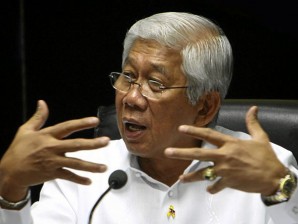MANILA, Philippines—The Philippines and Japan on Thursday had “very frank discussions” on the territorial disputes in regional seas without specifically mentioning China, which has been aggressively asserting its claim to islands that are within both countries’ territories.
Defense Secretary Voltaire Gazmin and visiting Japanese Minister Ichita Yamamoto discussed the territorial disputes at the Department of National Defense (DND) in Camp Aguinaldo.
Yamamoto, the state minister for Okinawa and affairs related to Japan’s northern territories, is the third Japanese official to visit the Philippines in the last three months.
Japanese Prime Minister Shinzo Abe came to visit and met with President Aquino in July and Defense Minister Itsunori Onodera was in Manila in June.
In a statement, the defense department said Yamamoto’s visit was “aimed to further reiterate Japan’s position and views under the administration of Prime Minister Abe on regional security issues, especially [in] the East China Sea.”
Gazmin and Yamamoto “acknowledged [that] the common concerns of the Philippines and Japan are issues related to maritime security,” the statement said.
Arbitration
It said Gazmin stressed the need for all parties, whether in the East China Sea or in the West Philippine Sea, to exercise strategic restraint.
Gazmin reiterated that the Philippines would continue to deal with the West Philippine Sea dispute through arbitral proceedings under the United Nations Convention on the Law of the Sea (Unclos).
Yamamoto supported the Philippines’ position and “stressed that Japan likewise adheres to the resolution of disputes through international law” and peaceful resolution, adding that Japan also “engages with other concerned countries to ensure regional peace and stability.”
Yamamoto, who also met with Foreign Secretary Albert del Rosario, said in a press briefing that he and Gazmin “had a discussion on territorial issues and ocean policies.”
“In my meeting with the foreign secretary and the defense secretary, I clearly and precisely explained Japan’s position on Senkaku Islands. Please allow me to refrain from the details (of) the discussion we had because we had a very frank discussion,”
Yamamoto told reporters following his meeting with Gazmin.
Gazmin did not join Yamamoto in the press briefing, as he had to attend a security cluster meeting in Malacañang reportedly to discuss the latest development in Panatag Shoal (Scarborough Shoal) where the military had monitored the presence of three Chinese coast guard vessels.
The Navy had seen 75 concrete blocks within a 2-hectare area in the shoal, which the defense department said could be a prelude to the construction of more permanent structures there.
Two top security officials described the presence of the concrete blocks as an “effective occupation” of Panatag Shoal.
While he declined to give details pertinent to the Philippines’ and Japan’s national security, Yamamoto said he and Gazmin agreed that “any country should not try to change the status quo unilaterally by force.”
Rule of law
“The establishment of the rule of law is very, very important and also we agreed that both countries should cooperate with each other, to continue to send strong messages to the international community,” Yamamoto said.
Yamamoto, a seasoned Japanese diplomat, refrained from answering questions about the proposed increased rotations of American forces in the Philippines.
“I would like to refrain from making detailed comments, because I understand that is an issue that the government of the Philippines has been working on. However, both the foreign secretary and the defense secretary mentioned the importance of cooperation between the Philippines and the United States in the fields of national security,” Yamamoto said.
Deterrence
“The basic policy of the Abe administration is that the American presence is very important to Japan in terms of the deterrence that it provides,” he added.
Yamamoto’s three-day trip to the Philippines included a visit to Clark Air Base in Pampanga province and Subic Naval Base in Zambales province to see how the Philippines converted the two former US military bases into viable commercial zones.
